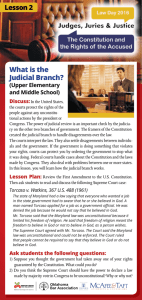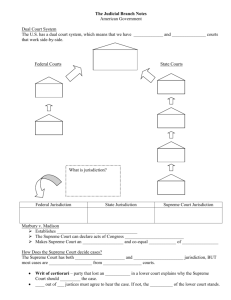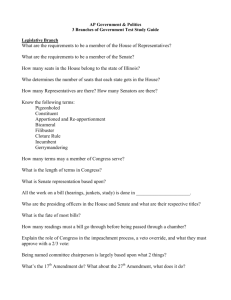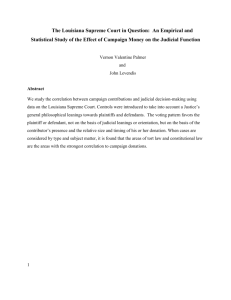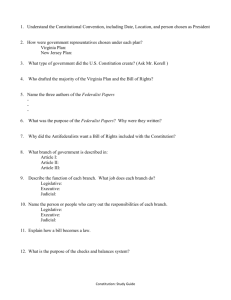Equal Justice Under the Law
advertisement
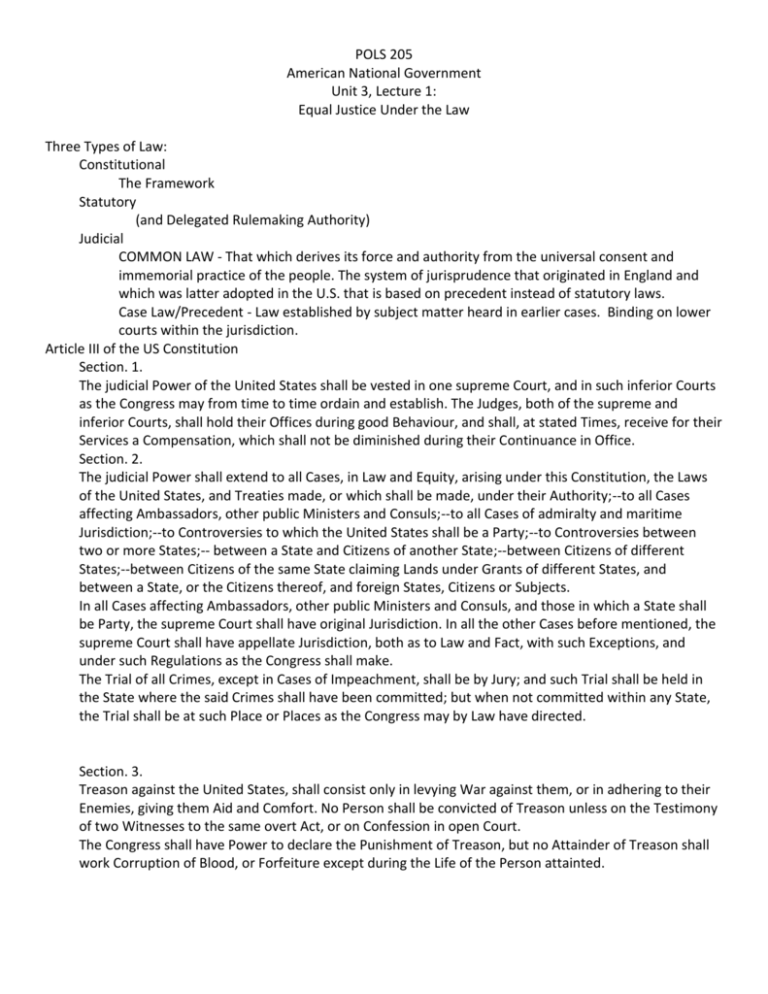
POLS 205 American National Government Unit 3, Lecture 1: Equal Justice Under the Law Three Types of Law: Constitutional The Framework Statutory (and Delegated Rulemaking Authority) Judicial COMMON LAW - That which derives its force and authority from the universal consent and immemorial practice of the people. The system of jurisprudence that originated in England and which was latter adopted in the U.S. that is based on precedent instead of statutory laws. Case Law/Precedent - Law established by subject matter heard in earlier cases. Binding on lower courts within the jurisdiction. Article III of the US Constitution Section. 1. The judicial Power of the United States shall be vested in one supreme Court, and in such inferior Courts as the Congress may from time to time ordain and establish. The Judges, both of the supreme and inferior Courts, shall hold their Offices during good Behaviour, and shall, at stated Times, receive for their Services a Compensation, which shall not be diminished during their Continuance in Office. Section. 2. The judicial Power shall extend to all Cases, in Law and Equity, arising under this Constitution, the Laws of the United States, and Treaties made, or which shall be made, under their Authority;--to all Cases affecting Ambassadors, other public Ministers and Consuls;--to all Cases of admiralty and maritime Jurisdiction;--to Controversies to which the United States shall be a Party;--to Controversies between two or more States;-- between a State and Citizens of another State;--between Citizens of different States;--between Citizens of the same State claiming Lands under Grants of different States, and between a State, or the Citizens thereof, and foreign States, Citizens or Subjects. In all Cases affecting Ambassadors, other public Ministers and Consuls, and those in which a State shall be Party, the supreme Court shall have original Jurisdiction. In all the other Cases before mentioned, the supreme Court shall have appellate Jurisdiction, both as to Law and Fact, with such Exceptions, and under such Regulations as the Congress shall make. The Trial of all Crimes, except in Cases of Impeachment, shall be by Jury; and such Trial shall be held in the State where the said Crimes shall have been committed; but when not committed within any State, the Trial shall be at such Place or Places as the Congress may by Law have directed. Section. 3. Treason against the United States, shall consist only in levying War against them, or in adhering to their Enemies, giving them Aid and Comfort. No Person shall be convicted of Treason unless on the Testimony of two Witnesses to the same overt Act, or on Confession in open Court. The Congress shall have Power to declare the Punishment of Treason, but no Attainder of Treason shall work Corruption of Blood, or Forfeiture except during the Life of the Person attainted. The Supremacy Clause (Article VI) This Constitution, and the Laws of the United States which shall be made in Pursuance thereof… shall be the supreme Law of the Land. Only those laws made in pursuance of the constitution AMENDMENT XI Passed by Congress March 4, 1794. Ratified February 7, 1795. The Judicial power of the United States shall not be construed to extend to any suit in law or equity, commenced or prosecuted against one of the United States by Citizens of another State, or by Citizens or Subjects of any Foreign State. (States can’t be sued in Federal Court by citizens or by foreign countries) Passed partly in response to Chisholm v. Georgia Statutory Law The Judiciary Act of 1789 Current Statute: Title 28 of the US Code http://assembler.law.cornell.edu/uscode/html/uscode28/usc_sup_01_28.html Supreme Court Rules http://www.supremecourtus.gov/ctrules/ctrules.html Precedent The judicial practice by which the courts generally follow previous decisions involving the same issue. (Wasserman) A judicial ruling that permits the court ruling settling an old case to govern the rule used to settle a similar new one (G.Q. Wilson) Stare Decisis – to stand on decided cases; the judicial policy of following precedents established by past decisions. (Schmidt) Marbury v Madison (1803) "It is emphatically the province and duty of the judicial department to say what the law is. Those who apply the rule to particular cases, must of necessity expound and interpret that rule. If two laws conflict with each other, the courts must decide on the operation of each." — Chief Justice John Marshall The Birthright of Judicial Review The irony: The landmark case for judicial review is based on a finding that the Supreme Court did not CONSTITUTIONALLY possess a particular power (give a little, get a lot!) The Supreme Court has the power to decide what the constitution means. McCullough v Maryland (1819) The Second National Bank and the state of Maryland Two elements: The Supremacy Clause Article 6, Clause 2 (Judicial Review of STATE activities) The “Necessary and Proper” clause Article 1, Section 8, Clause 18 (A handy-dandy expansion of federal powers) And in Summation… The Judicial branch, like the Executive and the Legislative, is authorized and empowered by Constitutional Provisions: Article III of the US Constitution Statutory Law: US Code Title 28 Case Law and Precedent: Marbury v. Madison, McCulloch v. Maryland, etc. (And I DO mean etc.) State v Federal 96 million filings in state courts annually 99% of all litigation in the US 2/3 are traffic cases The remaining third is split between criminal and civil cases Which is Which? Criminal Case: The State v The Accused California v OJ Simpson Florida v Joe Francis Crime against society or individual Penalty – Jail or Fines Civil Case Plaintiff vs. Respondent Brown (family of Nicole Brown) vs. Simpson Seeking equity or judicial relief or enforcing contracts Settlements or civil penalties Now Let’s Go…. Federal District Courts http://pacer.psc.uscourts.gov/map.html Ninety Four Federal District Courts United States Courts of Appeals Supreme Court Relative Caseloads 649 District Court Judges dispose of approximately 260,000 cases annually 179 Court of Appeals Judges dispose of 55,000 approximately cases annually 9 Supreme Court Justices hear less than 100 cases each Session Judicial Terminology Jurisdiction – the authority of a court to hear and decide a case Geographic What Courts of Appeals is your District Court within? Subject matter Criminal or Civil? Writ of Certiorari An order for a lower court to send up the records of a case for review It means, in Mom speak, “We’ll see” Rule of 4: Four justices must approve for a writ to be issued (95% of requests are rejected) Standing You must have a sufficient stake in the matter to justify bringing suit The party bringing the suit must have suffered harm or threat of harm Must be “justiciable”, not hypothetical or academic Thank You, Dr. Jack Shock (To the tune of Jesus Loves Me) Breyer Ginsburg Kennedy Alito Roberts; he’s the chief Scalia Sotomayor, too Kagan Thomas, that’s our crew! Supreme Court Justices, Supreme Court Justices, Supreme Court Justices, they wear black robes for YOU!


